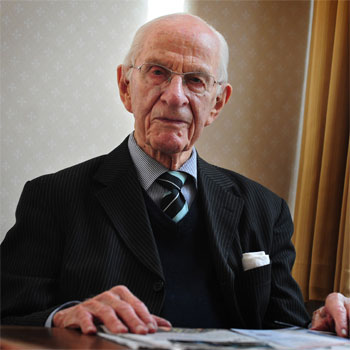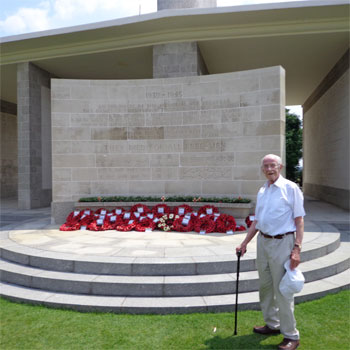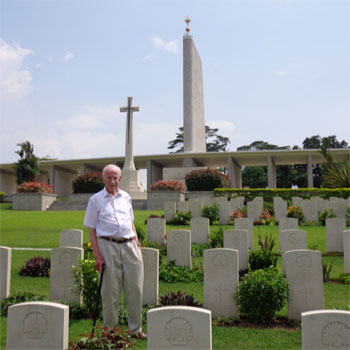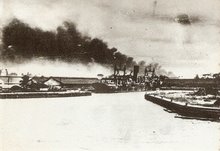I am very much looking forward to hosting Bill Frankland at the Singapore Cricket Club for lunch next month. I am told Bill was at the Cricket Club for 3 hours when it was a makeshift hospital on February 13 1942 which was two days before the British surrender. I found this article on Bill's last Singapore visit......
London Second World War veteran Bill Frankland, a renowned allergist and registrar to Sir Alexander Fleming in the development of penicillin was studying medicine at St Mary’s Hospital Medical School when war broke out. Bill accepted a commission in the Royal Army Medical Corps and in late 1941 with the rank of Captain he joined a team of 30 doctors as they embarked on a two-month long voyage to Singapore.
Bill, who is approaching his 101st birthday in March recalls:“We were on our way to form a new general hospital in Johor Bahru. But when we arrived it was decided that there would be no new hospital and we would be split into two groups.
“I spun a coin and went to Tanglin Military Hospital and my friend went to Alexandra Military Hospital. It was three days before Pearl Harbour.”
Two months later on Friday 13thFebruary 1942, known as Black Friday, allied forces were in full retreat as the Japanese seized most of the reservoirs leaving the city with only seven days water supply.
Caught under constant heavy mortar fire Bill transferred his patients from Tanglin to a makeshift hospital in the Fullerton Theatre in the centre of Singapore.
When the Japanese invaded Singapore Bill’s friend and colleague was murdered along with nursing staff and patients, one in the middle of surgery, as the marauding soldiers, armed with bayonets, and ignoring a white flag of truce stormed the Alexandra Hospital on a killing spree.
Bill recalls: “The Japanese had no plans on how they would deal with prisoners. We were sent to Changi. It was an 18 mile march, but I went by lorry with my patients. There was a lot of dysentery and after six months we were all starving. I was looking after one of the dysentery wards and saw little of the Japanese. Our guards were mostly Koreans and later Indians.”
But soon the PoWs were being sent to work on the notorious Thai-Burma death railway. Bill was transferred to a working camp, formerly a British Artillery barracks on Blakang Mati Island, known then as Hell Island, now Sentosa.
He remembers: “I never saw the sea, even on the island. In the camp there were 75 per cent Australians and men from the British 18th Division. In my working group I knew every man personally. We lived off meagre rations of rice and everyone suffered from gross starvation. All we could think of was food. When we could we ate rats, mice and dogs.”
Apart from chronic dysentery other tropical diseases such as malaria, dengue fever and starvation beriberi were rife amongst the prisoners. However, even this didn’t save them from the relentless forced labour instigated by their captors.
Bill recalls: “The Japanese kept us all busy. If my sick parade got too large a Japanese private, non medical would take my sick parade and put them to work if they were strong enough to stand.
“If the men’s behaviour was bad the Japanese would bash the officers. They would line us up and just punch us in the face.
“The best bashing I ever had was when I was knocked unconscious. I didn’t feel much but when I got up I realised I had lost a tooth.
“Once a soldier came up to me and said he was going to kill me and he tried but I survived it. I think at the time it may have been in revenge for some allied victory abroad.”
Those who attempted to get away ran a hazardous course with the Japanese paying local people 100 dollars to give up escapees.
He said: “I looked after a marvellous man who had tried to escape. He had ulcerated legs, dysentery, malaria and starvation beriberi. After two months he was getting better and I was about to return him to his unit when a police officer from the much feared KEMPI Military Police came round with an armoured guard of Sikhs.
“They ordered him to dig his own grave but he was much too weak to do it so the Sikhs had to dig the grave. They were then ordered to shoot him but only one hit him so the police officer finished him off with a pistol.”
In May 1945, Australian troops landed in Borneo and British, American and Chinese forces defeated the Japanese in Burma, while American forces also moved towards Japan, capturing the islands of Iwo Jima and finally Okinawa.
Bill recalls: “Each corner of the prison parade ground was covered by machine gun posts. There was a Japanese order that if the Americans set foot in Japan all PoWs were to be killed. This would include 120,000 in all.”
“When the atom bomb was dropped we thought the war was finished but the local Japanese command said it wasn’t and fired on the VJ planes coming over Singapore. Five or six days after VJ day we asked to see a Japanese officer. It was a very risky thing to ask anything from a Japanese officer but we wanted to be released.”
The next day they were allowed to leave Blakang Mati and went back to Singapore Island. It would be Bill’s first taste of freedom for three and a half years. Bill remembers: “I was flown from Singapore to Rangoon 12 days after VJ day. There was this marvellous Red Cross woman at the airport who gave me sandwiches. It was the first time I’d had bread in over three years.
“Shortly after I was examined by a doctor who pressed my stomach and said I had an enlarged spleen. But I said ‘no ‘it’s bread!’ But he still had me admitted to hospital.”
Arriving back in England in November he recalls: “The first thing I was asked was whether I wanted to see a psychiatrist. I said ‘no, I want to see my wife’.”
Less than two months later Bill was back at work at St Mary’s Hospital in Paddington. A renowned allergist, whose achievements include the popularisation of the pollen count as a vital piece of weather-related information and the prediction of increased levels of allergy to penicillin, Bill is also a key expert witness in matters of allergy.
Recently making a Heroes Return 2 trip to Singapore with his daughter, he said: “I don’t think I would have gone without the grant. I went up to the Kranji Memorial to pay my respects to those who lost their lives. It was very quiet in November and I was all on my own. It was quite emotional.”





No comments:
Post a Comment